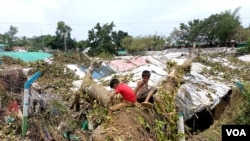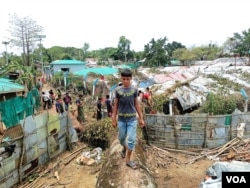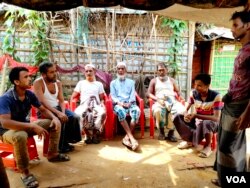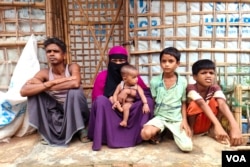On a cold evening, after completing her maghreb (post-sunset) prayer, a woman holds her children close to keep them warm with her threadbare scarf. They sit huddled together outside a now-dilapidated shelter made of bamboo sticks and plastic sheets — their home. Shielded from her children’s gaze, the mother of two lets tears slip down her face.
The widowed woman, 28-year-old Konsoma Khatun, is one among the million Rohingya refugees in Cox’s Bazar, Bangladesh, who have been affected by the devastating Cyclone Mocha that hit parts of the country and Myanmar in May.
The flooding and landslides caused by the tropical cyclone destroyed or damaged the shelters of around 40,000 refugees residing in the Cox’s Bazar camps, according to U.N. officials.
The damage done was not just physical, though.
“The cyclone did not harm me physically, and our shelter has only been partially damaged. But something else seems to have taken over me. I simply cannot muster the will to move,” Konsoma told VOA in a pair of phone and video interviews.
When asked if the reason behind her stress was the latest food ration cuts implemented by the World Food Program, the only source of proper meals for most Rohingya refugees in Bangladesh, Konsoma denied it.
“The only decent meal my children and I receive is that from WFP, provided to us once a week or so. But it is not that — the cyclone has affected my mind. My sadness is not allowing me to get up and make some arrangements for my children, who have been hungry for days. I feel completely lost,” she said.
Although most of them are not aware of the formal terminology of it, the Rohingya community in Bangladesh is undergoing a “severe mental health crisis, according to a study published in 2020 by Fortify Rights, a human rights organization based in Southeast Asia.
John Quinley III, director at Fortify Rights, told VOA that Cyclone Mocha is just one of the many issues affecting the mental health of the Rohingya.
“The Rohingya are genocide survivors and have experienced horrific crimes by the military in Myanmar. They still experience abuse at the hands of many in the Bangladesh camps where they live now,” he said.
Research conducted by Fortify Rights also revealed that besides depression and emotional distress, the trauma symptoms experienced by many of the Rohingya indicate Post-Traumatic Stress Disorder (PTSD), a mental health condition that can hinder one from living a constructive life.
Konsoma has been living in Cox’s Bazar as a refugee for more than five years. She says, “Sometimes I feel it would be better to die than to live as a Rohingya here with unsurmountable suffering.”
Aiming to extend a helping hand, the U.N. Refugee Agency (UNHCR) and several local and international NGOs like Action Against Hunger (ACF) have set up mental health and psychosocial support (MHPSS) initiatives for the refugees in Bangladesh.
Hivine Ali, UNHCR Mental Health and Psychosocial Support Officer in Cox’s Bazar, said that since mental health is an issue that affects all, every UNHCR intervention for the Rohingya such as Child Protection, Health, and Gender-based Violence has integrated mental health support components.
“We also work with a network of Rohingya refugees who are trained in psychosocial support. They raise awareness in their own community on topics, such as anger management, positive parenting skills and child-to-child peer support,” she told VOA.
Laetitia Clouin, ACF’s MHPSS and Protection Technical Advisor for Asia, told VOA that while ACF had widespread MHPSS programs in Cox’s Bazar until 2022, they now have a team of psychologists and psychosocial workers supporting mothers and malnourished children in two stabilization centers in the camps.
However, many have criticized the efficacy and quality of these initiatives.
Mohammed Eliyeas, 53, a Cox’s Bazar-based Rohingya refugee, told VOA that neither organization-affiliated professional counsellors nor Rohingya volunteers provide effective mental health support to the community.
“The counsellors and volunteers often just spend the time gossiping about petty issues.
“I had been participating in MHPSS programs long before Mocha. I even used to visit camp-based NGO healthcare centers, but to no avail,” he said over the phone.
Mohammed Rezuwan Khan, a Rohingya activist in Cox’s Bazar, said that the MHPSS programs available to Rohingya refugees in Bangladesh are ineffective.
“As a community that has been the victim of severe human rights abuse, not being able to amend our damaged shelters and receiving little to no aid from NGOs after the cyclone makes us feel voiceless and invisible,” he told VOA.
Fortify Rights director Quinley said, “Refugee human rights defenders we have worked with over the years have cited slow referral pathways for protection services and mental health support. Refugees have also told Fortify Rights that the response times on the UNHCR hotline are extremely slow; this must be urgently improved.
“I visited the camps in Bangladesh last month. There was a sense of hopelessness among refugees. Governments worldwide should continue to support the humanitarian needs of refugees, including mental-health services,” he said.







